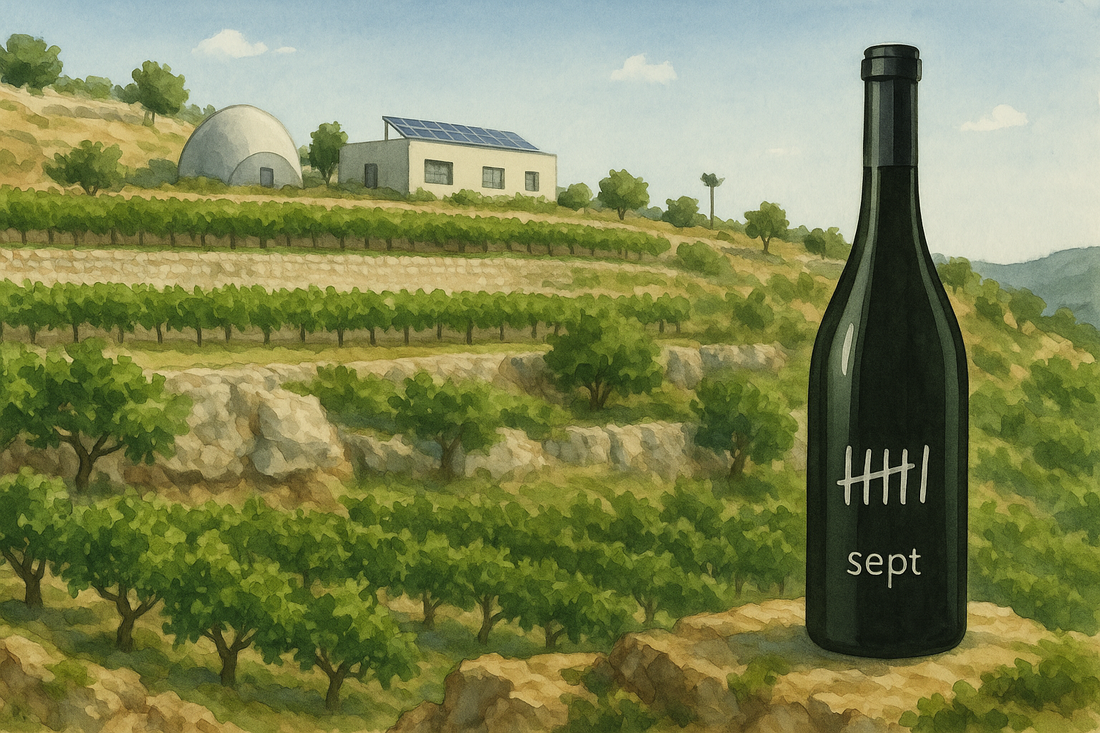
Share
Welcome to the Seventh Heaven: Lunch at Sept Winery

How Maher Harb’s vin du lieu celebrates native grapes and seasonal cooking: kishek‑dressed arisheh, awarma‑layered potatoes, and clean, natural wines.
By noon, the heat had begun to lean on Batroun like a lazy mastiff, and our hotel—grand in brochure, glum in person—had offered up its last limp smile. We fled. The car shouldered up the mountain road to Nehla, that ribbon of tarmac that kinks and coils until the Mediterranean drops behind you and the air grows thin with pine. A village appeared, all white walls and shadows. Then a terrace—Sept—poured out over a view that looked suspiciously like a screensaver. Tables under a slant of shade. Vines up the slope. A breeze that earned its lunch.
A young man greeted us with a kind of practised warmth—genuine, but tidy around the edges—and set out, with enviable clarity, “the concept of Lunch.” He handed us a printed menu. Welcome home, it said at the top, and then did a remarkable thing for a menu: it spoke more of wind and rain than of garnish. “Everything is alive… a conversation between nature, craft, and the people gathered around.” Imagine being told to sit and trust in bold type. Reader, we did.
Sept’s tale begins in 2012, when Maher Harb—then living in France, solving other people’s problems with mathematics and PowerPoint—decided to test whether stubbornness could be cultivated like a vine. He planted his father’s small plot with indigenous grapes and put his savings into a global apprenticeship in winemaking. In 2016, he bottled his first wine. Why Sept? It’s the number that links him to his father —a hinge, a private superstition that has turned into a label. I like a winemaker who admits to being influenced by numerology. If terroir is fate expressed in geology, why shouldn’t luck have a seat at the table?
Harb calls what he makes vin du lieu—wine of the place—and he means Lebanon, not just the handkerchief of soil around Nehla. Not all of Sept’s fruit comes off his own land. He seeks out plots across the country, coaxing Oubaida and Merwag—the old names, the old bones—into bottles that behave like good dinner guests. Biodynamic and natural, yes, but blessedly not the natural that smells like your gym bag after August. Sept is clean and textural, the fruit vivid, the edges mineral. Imagine thirty thousand such promises a year, three-quarters of them posted off to fifteen countries, pouring quietly in Michelin-starred dining rooms—five of those with three stars glittering above the door. Harb’s rebellion is polite but firm: Lebanon is a wine land, and its indigenous grapes don’t need to borrow prestige from anyone else’s blends.
He learned to cook while travelling to pour his wines. This is the detail that dials lunch at Sept from charming to inevitable. You can feel the cross-training on the plate. The menu is micro-local to the point of mischief: goat meat and milk from the neighbour, squid pulled from the bay that morning, vegetables out of his own plots. At first glance, the dishes speak a cosmopolitan tongue—the plating clean, the forms familiar to anyone who’s suffered a chef’s tasting menu in a world capital. And yet the ingredients keep whispering Levantine truths.
Take the arisheh, a clotted cream so delicate it seems a mistake to breathe near it. It arrived under a drift of herbs, a vinaigrette of kishek carrying the tang. I’m used to kishek on manoushe, held in the hand, devoured before the paper collapses. Here it showed up as an elegant dressing, fermented wheat and milk made haute without a hint of hauteur. I was primed for gimmickry. Instead, I got a flavour that felt like a family story retold in a new room.
Then came a love letter to the mountain table: mfaraket batata—those potatoes and onions fried down with meat until the kitchen smells like a hug. Sept’s version was built in layers like a pastry: onions and potatoes simmered in the rendered fat of the goat we had just met in tartare, capped with awarma, the preserved goat confit that carries winter in its pockets. It was the sort of dish that makes time slippery. Nobody spoke for a minute. Someone’s fork paused mid-air as if a pause button had been pressed in the sky.
Speaking of the tartare: epic is a vulgar word, but I’ve already used majestic on the view. Goat minced by hand, brined capers for bright little sparks, onion and garden herbs knitting the whole thing together, and a crown of Danish caviar. (Along with a discreet dash of soy for bass notes, the only two ingredients not local.) The goat was sweet, the texture firm, the caviar a mischievous wink rather than an exclamation mark. It’s a plate that refuses to shout, and therefore you lean in.
All the while, the wines behaved like well-brought-up children—curious, articulate, occasionally surprising but never rude. The Oubaida slid in with stone fruit and a saline hush; the Merwag had that phenolic grip that makes you wonder who taught it to shake hands so confidently. A red—one of the single-site bottlings—carried freshness up the mountain on its back. Natural, but not funky, our host had said. He was right. If there was a halo of wildness, it was the sort that keeps you awake to place rather than begging for forgiveness.
Service deserves a paragraph of its own. The night before, we’d endured a “posh” dining room in town where charm must have been off shift. Up here, with a five-person team and the sky for a ceiling, everything worked as if by quiet spell: plates arriving with unhurried precision, explanations given with intelligence but never the brittle kind. It felt less like hospitality being performed and more like a belief being practised—the staff tuned in to the same frequency as the hillside and the cellar.
Numbers brought us here—seven for the name, three years of consulting, thirty thousand bottles—but what stayed with me were more minor counts: the scatter of capers on the goat, the two non‑local ingredients allowed in on merit, the one page that told us to sit and trust, and the many ways a place can taste of itself. Sept is not a museum of Lebanese foodways, nor a trance of nostalgia. It is, instead, a fluent conversation between what grows and what’s possible.
We rewound down the mountain in the late light, the sea reappearing like a promise kept. The disappointing hotel couldn’t touch us now. Somewhere behind us, a young man was explaining lunch again to a new table, the wind was turning the vines into a slow wave, and Maher Harb’s seventh heaven was doing what good wine places do: making the world seem both larger and more legible. A perfect end to a weekend in the sun—and a reminder that when a winemaker says Welcome home, you should probably stay for dessert.
